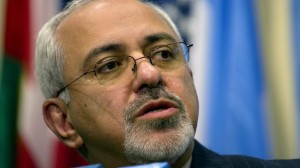 Iran�s Foreign Minister Mohammad Javad Zarif says the nuclear negotiations with six world powers are moving forward slowly.
Iran�s Foreign Minister Mohammad Javad Zarif says the nuclear negotiations with six world powers are moving forward slowly.
�To achieve a different future and to prepare the necessary ground for turning the mistrust of the past decade into mutual trust, it is necessary for Iran and the P5+1 (permanent members of the UN Security Council plus Germany) to implement what has been agreed upon by the foreign ministers seriously, carefully and with goodwill,� Zarif said at a joint press conference with his Italian counterpart Emma Bonino in Tehran on Sunday.
He noted that Tehran�s expert-level nuclear talks with the representatives of the six countries are not easy, adding, �Agreement must be reached on details and minutiae in these [expert-level] talks. The process is moving forward slowly but based on the principles that I said.�
Iran and the six countries wrapped up�the third day of�their latest round of expert-level talks on Saturday. The talks are aimed at working out the details for the�implementation of the landmark nuclear deal they struck in Geneva last month.
On November 24, Iran and the six countries inked an interim deal in the Swiss city to set the stage for the full resolution of the dispute over Iran�s nuclear energy program.
As part of the Geneva deal, it was agreed that in exchange for limiting certain aspects of its nuclear activities, Iran would be provided with a certain amount of sanctions relief and that no more nuclear-related sanctions would be imposed on the country for six months.
Zarif described the nuclear deal as �a very important development, which should be viewed within the wide framework of the future of Iran-Europe ties.�
The Iranian foreign minister also noted that he will hold a telephone conversation with EU High Representative for Foreign Affairs and Security Policy Catherine Ashton, who represents the six countries, on Sunday afternoon.
On December 12, Iran and the six world powers wrapped up four days of intense expert-level negotiations at the headquarters of the International Atomic Energy Agency (IAEA) in the Austrian capital, Vienna.
By Press TV
The Iran Project is not responsible for the content of quoted articles.

 QR code
QR code